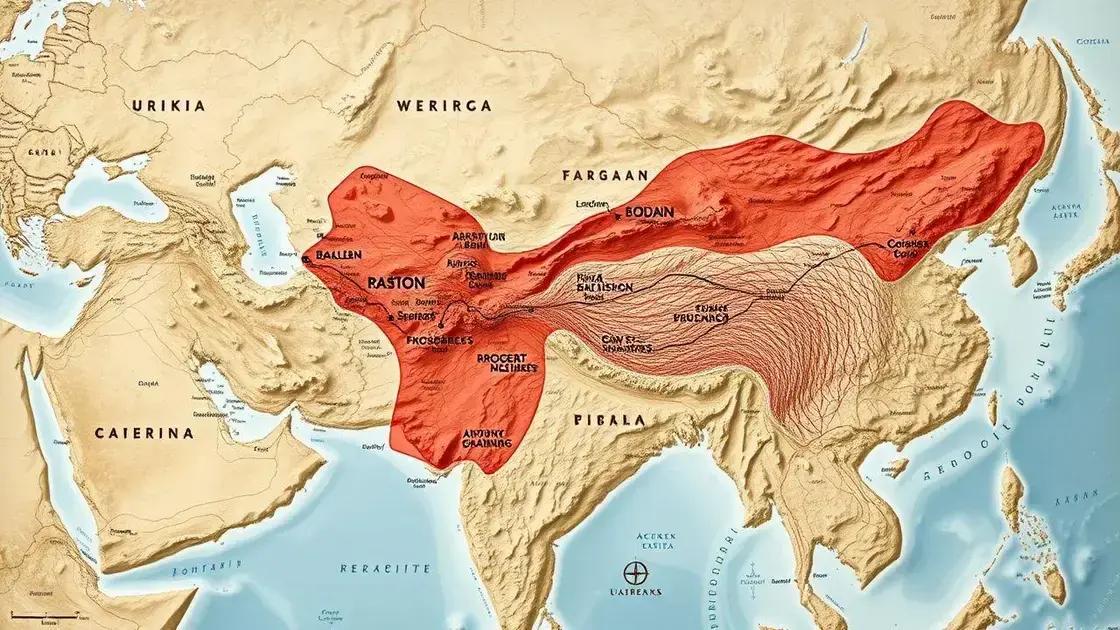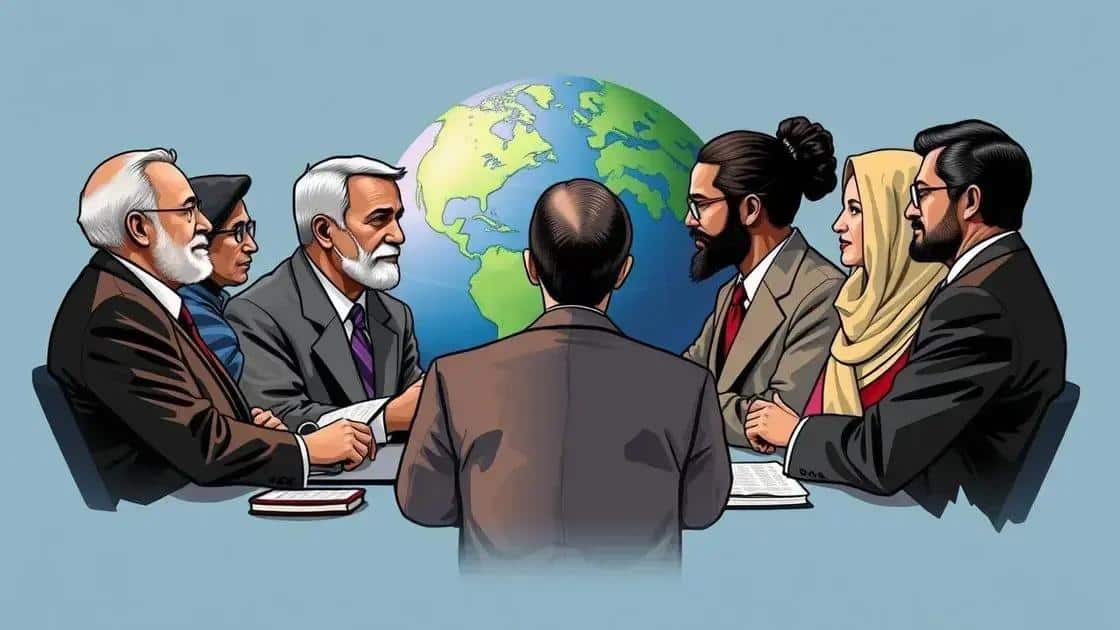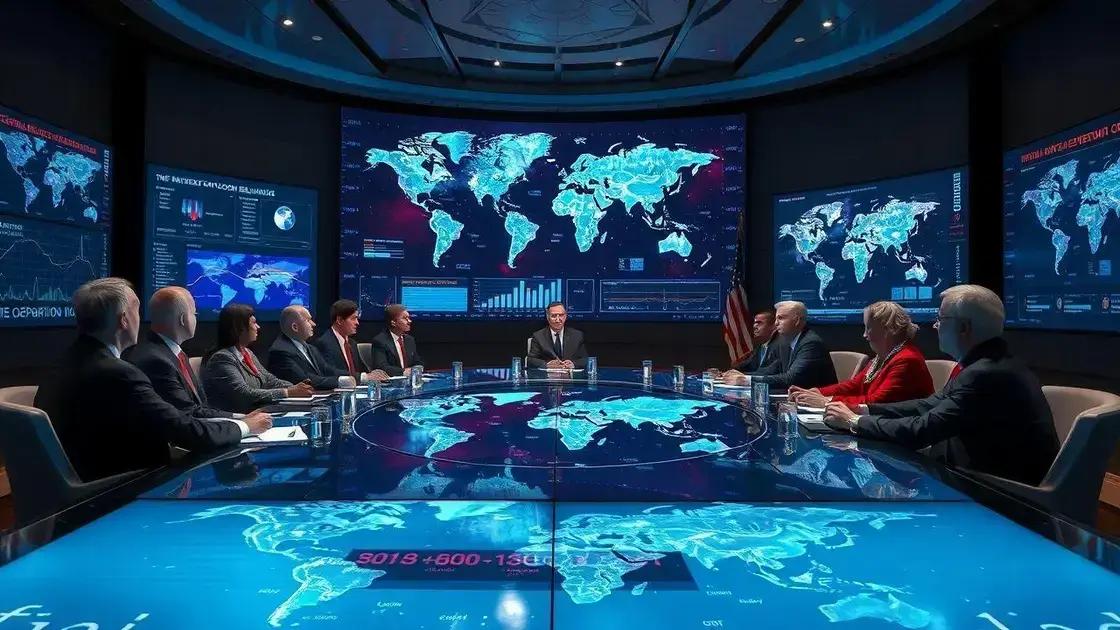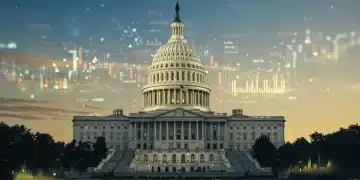International relations and border tensions: what to watch

International relations and border tensions significantly impact global politics, influencing alliances, economic stability, and diplomatic interactions among nations, while requiring cooperation to address shared societal challenges.
International relations and border tensions are crucial topics today, influencing everything from trade to security. Have you ever wondered how these dynamics shape our world? Let’s dive in and explore.
Understanding the roots of border tensions
Understanding the roots of border tensions is essential in grasping the complexities of international relations. These tensions often arise from historical, political, and social factors that shape a nation’s identity and interactions with its neighbors.
For instance, many countries have longstanding disputes over territories that can be traced back to colonialism or conflicts. These historical grievances fuel anger and mistrust among nations. It’s fascinating to see how these old disputes can lead to modern conflicts.
Key historical factors
Several historical events play vital roles in creating border tensions. Some come from wars, while others stem from treaties that may have favored one nation over another:
- Colonial legacy: Borders were often drawn without consideration of ethnic groups.
- Post-war settlements: The outcomes of wars can lead to new tensions.
- Economic disparities: Differences in wealth can fuel rivalry and conflict.
Moreover, cultural identities greatly influence how nations view themselves and their neighbors. When people feel their cultural identity is threatened, it can escalate tensions at the borders. In many regions, national pride and cultural heritage can hinder diplomatic efforts.
As such, understanding these roots allows us to see how deeply intertwined these issues are. By exploring the past, we can gain insights into the current challenges nations face in building peaceful relations. The roots of these tensions are not easily resolved, as they often need careful, sensitive dialogue and an understanding of historical context.
Ultimately, addressing border tensions requires acknowledging these historical grievances while also seeking pathways for cooperation and understanding. The way forward lies in not only recognizing past injustices but also fostering dialogue and mutual respect among nations.
Key players in international relations

In the complex landscape of international relations, several key players influence policies and decisions. These players can be countries, organizations, or non-state actors, each with unique interests and strategies.
Nation-states are often the most visible actors on the global stage. They have the power to shape alliances, engage in diplomacy, and impose sanctions. Understanding the motivations of each country is crucial since their actions can affect global stability.
Leading global powers
Prominent nations tend to wield significant influence:
- United States: A dominant military and economic power with extensive global interests.
- China: Rapidly rising in influence, especially in economic matters and regional politics.
- European Union: Represents a collective of nations that play a crucial role in international trade and diplomacy.
International organizations also play an essential role in fostering cooperation among nations. Groups such as the United Nations and NATO bring countries together to promote peace and security. These organizations provide platforms for dialogue, allowing states to negotiate peaceful resolutions.
In addition to countries and organizations, non-state actors are becoming increasingly important. Non-governmental organizations (NGOs), multinational corporations, and even influential individuals can sway public opinion and drive policy changes. For instance, advocacy groups often raise awareness about critical issues, pressing governments to act.
The interaction between these various players is intricate and can lead to both collaboration and conflict. The effectiveness of diplomacy often depends on how well these players can navigate their differing priorities. Understanding this dynamic is essential for anyone interested in the field of international relations.
Impact of border tensions on global politics
The impact of border tensions on global politics is profound and far-reaching. These tensions can disrupt trade, create diplomatic rifts, and lead to conflicts between nations. Understanding their effects helps us grasp the intricate web of international relations.
When countries engage in border disputes, it often leads to heightened military presence and increased security measures. This not only affects the countries involved but can also create long-term implications for their neighbors. As tensions rise, global markets may react negatively, causing economic instability.
Diplomatic relations
Border tensions frequently strain diplomatic relations. Countries may withdraw ambassadors or impose sanctions as a show of force. Such actions can hinder cooperation on various global issues, including climate change, health pandemics, and economic development. Additionally:
- Alliances shift: Nations may form new alliances based on shared interests or collective security concerns.
- Public opinion: Citizens often rally behind their governments during conflicts, affecting domestic politics.
- International organizations: Bodies like the United Nations may struggle to mediate effectively when tensions are high.
The ramifications of border tensions extend beyond individual nations. They often lead to increased military spending, diverting resources from critical areas like education and health care. This can create further hardship for citizens, especially in regions directly affected by conflict.
Bilateral relations suffer as well since many aspects of diplomacy rely on trust and communication. When tensions escalate, it becomes challenging to engage in constructive dialogue, leading to a cycle of hostility. The international community must pay attention to these tensions, as they can signal larger geopolitical shifts and uncertainties.
Future outlook for international relations

The future outlook for international relations is filled with uncertainty and potential. As global challenges arise, nations must adapt to remain relevant in the shifting landscape of politics.
Technology is transforming how countries interact. Communication happens at lightning speed, allowing real-time dialogue and immediate responses to crises. However, this also means that misinformation can spread quickly, complicating diplomatic efforts.
Global challenges ahead
Several challenges will shape international relations in the coming years:
- Climate change: This issue requires global cooperation to combat its effects.
- Economic disparities: Growing inequality between nations can lead to unrest and conflict.
- Geopolitical tensions: Rivalries among major powers can disrupt peace.
Additionally, international organizations will need to adjust to these evolving dynamics. Organizations like the United Nations may face pressure to reform and become more effective in addressing contemporary issues. Ensuring that all voices are heard is crucial for global harmony.
Increased collaboration will be essential to tackle shared problems. Countries may need to forge new alliances or strengthen existing ones. Emphasis on diplomacy and negotiation can create pathways for peace, as nations realize that cooperation often yields better outcomes than conflict.
As emerging powers gain influence, the traditional balance of power may shift. Understanding these changes will be vital for maintaining stability in a rapidly transforming world. The future of international relations will depend on how well nations can navigate these challenges while fostering communication and collaboration.
In conclusion, the landscape of international relations is shaped by several factors, including border tensions, historical context, and emerging global challenges. Nations must navigate these complexities to promote cooperation and peace. As we look to the future, adaptability and communication will be key to building a stable and harmonious world.
FAQ – Frequently Asked Questions about International Relations and Border Tensions
What are the main causes of border tensions?
Border tensions often arise from historical disputes, cultural differences, and economic inequalities between nations.
How do border tensions affect global politics?
Border tensions can lead to strained diplomatic relations, military buildup, and economic instability, impacting international cooperation.
What role do international organizations play in resolving conflicts?
International organizations, like the United Nations, facilitate dialogue and negotiations to help resolve conflicts and promote peace.
How can countries foster better international relations?
Countries can improve international relations through diplomacy, open communication, and collaborative efforts to address global challenges.





